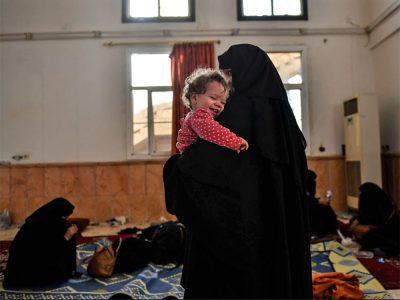
Canadian goverment vows to assist Montreal woman and her children who escaped the Islamic State ‘caliphate’
The Canadian government says it is committed to providing a 22-year-old Montreal woman and her two young children with consular services after they escaped Islamic State territory in Syria, but it’s not clear whether, upon her possible return to Canada, she will face charges for travelling overseas to join a terrorist organization.
The woman, her two-year-old daughter and newborn baby are currently detained by Kurdish forces in Syria, a senior Canadian government source told The Globe and Mail. The source, who declined to provide the woman’s name, said Global Affairs Canada is following its policy to provide consular assistance after the woman’s family requested it, leaving the RCMP and the Canadian Security Intelligence Service (CSIS) to decide whether she will face charges upon her possible return.
Toronto lawyer Nader Hasan confirmed that the woman recently escaped the Islamic State – also known as Daesh – in Syria.
“We have been working with Canadian authorities for months in an attempt to try to extricate her from Daesh territory. She was finally able to escape several weeks ago with the help of coalition allies. She is in Kurdish custody as she awaits transfer to Canada,” Mr. Hasan said in an e-mail.
Parliamentary secretary for consular affairs Omar Alghabra said the government is “aware of the case, in contact with the family and offering assistance.”
The news of the woman’s escape comes as the Liberal government faces questions regarding Canada’s plan for returning foreign fighters. The Conservatives grilled Prime Minister Justin Trudeau in Question Period on Tuesday over his government’s focus on reintegrating foreign fighters into Canadian society, rather than putting them behind bars. In response, Mr. Trudeau said the government uses a “broad range of tools” to keep Canadians safe.
“We have enforcement, surveillance and national-security tools that we use to a significant degree, but we also have methods of de-emphasizing or deprogramming people who want to harm our society, and those are some things we have to move forward on,” Mr. Trudeau said.
The woman left Canada in 2014, when she was 19 years old, and eventually made her way to Syria, where she married a German citizen, according to the source.
According to the source, the woman’s family said she was initially seduced by the Islamic State into travelling to Syria, but regretted her decision after arriving and wanted to come home. The source said the woman was thought to have been locked up in her home, looking after her children, in Islamic State territory.
The woman is now detained by the Syrian Democratic Forces, a U.S.-backed alliance of Kurdish and Arab fighters. The source said it is expected the woman will eventually return to Canada but did not know how soon that could happen.
It is a crime to travel abroad to participate in terrorist activity, but only two Canadian returnees have been charged with doing so. Public Safety Minister Ralph Goodale has said that pursuing charges against these individuals is challenging, as it is hard to translate intelligence information on them into evidence that will stick in court.
The RCMP refused to confirm whether it is investigating the Canadian woman, saying that it only comments on cases that result in criminal charges. However, Staff Sergeant Tania Vaughan noted that not all returnees pose the same kind of risk.
“There is an acknowledgment that not every individual returning from Iraq or Syria presents the same level of risk. For example, while some may be experienced fighters, others may be children,” Staff Sgt. Vaughan said in a statement.
“In cases where charges may not be appropriate or feasible, the RCMP may divert a file to partners who are better placed to manage it.”
The government estimates 180 individuals with a connection to Canada have travelled overseas to join terror groups. Lorne Dawson, director of the Canadian Network for Research on Terrorism, Security, and Society, an independent research organization, said there are about 100 Canadian foreign fighters in Syria and Iraq, including some 15 women.
While the government has said about 60 foreign fighters have returned to Canada, Mr. Dawson said he only knows of about 10 to 12 who have come back from Syria or Iraq. He said he is not aware of any female returnees.
Mr. Dawson said returnees – especially women with children – should be reintegrated if possible and given access to counselling services.
He said those services could be provided by organizations such as the Centre for the Prevention of Radicalization Leading to Violence, established by the city of Montreal and the Quebec government in 2015.
Source: The Globe and Mail





